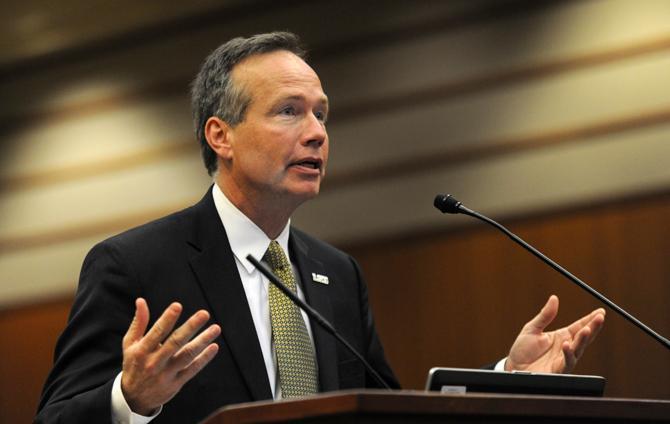Editor’s Note: This is the second in a three-part series looking back at F. King Alexander’s time at California State University Long Beach and ahead at his plans as the new LSU president.
Although LSU president F. King Alexander has moved to Baton Rouge, he’s making a home for himself in Washington, D.C.
Donald J. Para, interim president of California State University, Long Beach, said Alexander made frequent trips to Washington during his time at CSULB to discuss higher education policy with White House officials. Alexander said he will use contacts made during these trips to address the specific policy and funding issues the University faces.
As recently as Aug. 12, Alexander met with Undersecretary of Education Martha Kanter, and he said he plans to return to the capital in a few weeks to continue building support for initiatives such as Pell Grant awards and student loan interest rates.
Para said Alexander’s ability to work in Washington at the highest levels of policy making and raise CSULB’s national profile was one of his greatest assets.
“None of our other presidents were going to D.C. to talk to President Obama’s public policy group or were invited to Obama’s round table on education,” Para said.
While Para said Alexander would be well-suited for a government position related to education, he said the two of them had never spoken candidly about the possibility. However, working at Louisiana’s flagship University would no doubt be a stepping stone for Alexander as he determines his next career move, Para said.
“He spends a lot of time in Washington, D.C. King is one of their prime advisors,” Para said. “It’s logical to think there’s a place in D.C. for him.”
Alexander constantly received calls from other Universities trying to recruit him, according to Mary Stephens, CSULB vice president of administration and finance. When he got a call from LSU, she said, he was attracted to the combined president-chancellor role that gave him more responsibility.
“For Alexander, a person who could go into an institution like LSU that’s high-profile, high-performance with a med school and law school, and organize them in a way that will be successful, of course that’s going to be a résumé builder,” Para said.
From the beginning, Alexander said he knew he had to work with lawmakers to develop higher education policy.
In February 2007, Alexander was selected to lead a task force to make recommendations to the Department of Education for the Voluntary System of Accountability, a program that measured student learning at different universities around the country.
According to his former CSULB colleagues, he frequently met with numerous contacts in Washington, including senators and advisors for President Obama.
“Is he rubbing elbows with politicians? Yes. Is he doing it for political reasons? Kind of,” said Dan O’Connor, Academic Senate Chair at CSULB. “But it’s not about promoting a political position rather than just promoting public higher education.”
According to the LSU’s lobbyist, B. Jeffery Brooks of Adams and Reese, Alexander is in the early stages of planning “LSU Day,” when he and other System chancellors will travel to Washington to lobby lawmakers.
Brooks said the goal of LSU Day is to close the “innovation deficit” — the gap between federal funds needed for research and the funding that is supplied.
LSU Day will take place in January. In the meantime, Alexander said he will continue to meet regularly with Washington officials.
University Faculty Senate President Kevin Cope said the raised national profile Alexander can bring to the University could be useful, but also that he is skeptical of whether it will help to solve budget issues.
“LSU has been short of representation in recent years,” Cope said. “But that can only have so much impact because the situation is pretty bad right now.”
Alexander frequents D.C. to see officials
August 26, 2013
LSU President and Chancellor F. King Alexander speaks before the Board of Regents on Aug. 21, 2013 in the Louisiana Purchase Room located in the Claiborne Building in Downtown Baton Rouge.






